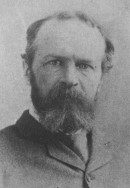 Melvyn Bragg at the BBC recently discussed my favorite book, William James’ The Varieties of Religious Experience
Melvyn Bragg at the BBC recently discussed my favorite book, William James’ The Varieties of Religious Experience, with a panel of three people, including Jonathan Ree, who was introduced with the incredible title of “freelance philosopher.” You can listen to the 45-minute program here. (Thanks to Levi Stahl for bringing it to my attention.) Early on, Ree concisely describes what I love (and what many people love) about James:
First of all, I think William James is one of the greatest philosophers ever, and he’s untypical. Twentieth-century philosophers, I think, fall into two groups: they’re either nitpicking, pettifogging bureaucrats or else they’re egomaniacs with delusions of genius. [laughter] He wasn’t like that. He was honest, witty, modest, flexible, generous, a very creative, open-minded thinker, and he produced prose which looks as though it was a spontaneous flow of very colloquial thoughts, but is actually incredibly carefully crafted.
Later on, Bragg asks Ree if the “figure up there, out there” in many religions exists in James’ philosophy. And Ree answers:
The point about religious experience is that it’s a sense of the unimportance of self. The idea that there’s some important thing called god is another way of expressing the idea that your own selfhood is not important, so it’s a self-abnegation [. . .] expressed by saying that I worship god. For William James, that’s equivalent to saying I don’t take myself terribly seriously.

